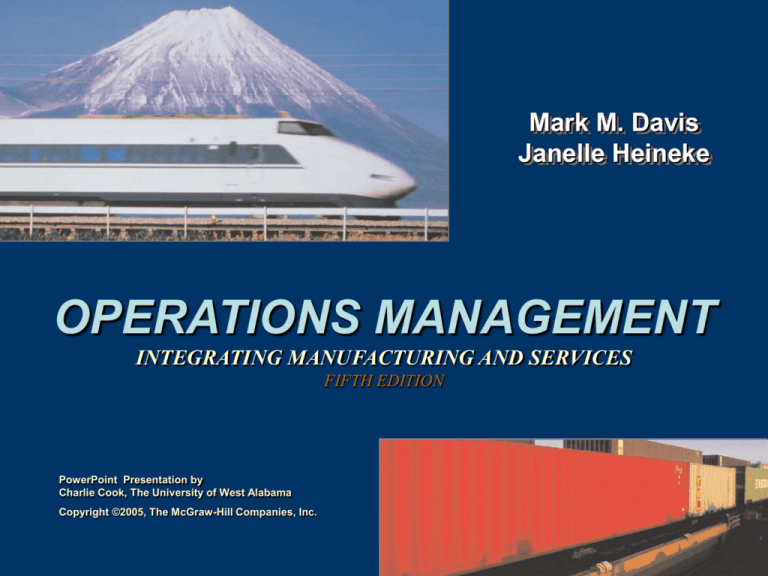
Mark M. Davis
Janelle Heineke
OPERATIONS MANAGEMENT
INTEGRATING MANUFACTURING AND SERVICES
FIFTH EDITION
PowerPoint Presentation by
Charlie Cook, The University of West Alabama
Copyright ©2005, The McGraw-Hill Companies, Inc.
CHAPTER
15
Inventory Systems for
Dependent Demand
PowerPoint Presentation by Charlie Cook
The University of West Alabama
Copyright © 2005 The McGraw-Hill Companies. All rights reserved.
CHAPTER OBJECTIVES
• Explain the changing role of materials requirements
planning (MRP) within a manufacturing organization.
• Discuss the role of MRP within an enterprise resource
planning (ERP) system.
• Introduce the fundamental concepts and calculations that
drive an MRP system.
• Define the elements that make up an MRP system.
• Demonstrate how MRP-related systems are applied in
service operations.
• Recognize that MRP and JIT can be used together within
an organization.
Copyright © 2005 The McGraw-Hill Companies. All rights reserved.
McGraw-Hill/Irwin 15–3
Managerial Issues
• Demand for components and services that are
highly variable and dependent on the demand
for the end product.
• Integrating materials requirements planning
(MRP) into enterprise resource planning (ERP)
systems to reduce inventory and lead times.
• The use of MRP to provide accurate information
for shop-floor control of inventories, processes
and due dates.
Copyright © 2005 The McGraw-Hill Companies. All rights reserved.
McGraw-Hill/Irwin 15–4
Master Production Schedule
• Master Production Schedule (MPS)
– A time-phased production plan that specifies how
many of, and when to build, each end item.
• Material Requirements Planning
– Determines the number of subassemblies,
components, and raw materials required and their
build dates to complete a given number of end
products by a specific date.
Copyright © 2005 The McGraw-Hill Companies. All rights reserved.
McGraw-Hill/Irwin 15–5
How MRP Integrates the Manufacturing Function
Exhibit 15.1
Copyright © 2005 The McGraw-Hill Companies. All rights reserved.
McGraw-Hill/Irwin 15–6
How ERP Integrates Organizational Functions
Exhibit 15.2
Copyright © 2005 The McGraw-Hill Companies. All rights reserved.
McGraw-Hill/Irwin 15–7
Integrating MRP and JIT into the Supply Chain
Exhibit 15.3
Copyright © 2005 The McGraw-Hill Companies. All rights reserved.
McGraw-Hill/Irwin 15–8
Master Production Schedule
• Time Fences
– Periods of time with each period having some
specified level of opportunity for the customer to
make changes.
– Frozen
• Make no or only insignificant changes to products.
– Moderately firm
• Allow some changes in specific products.
– Flexible
• Allow almost any variation in products.
Copyright © 2005 The McGraw-Hill Companies. All rights reserved.
McGraw-Hill/Irwin 15–9
Master Production Schedule Time Fences
Exhibit 15.4
Copyright © 2005 The McGraw-Hill Companies. All rights reserved.
McGraw-Hill/Irwin 15–10
Material Requirements Planning (MRP)
Systems
• Materials Requirements Planning System
– Creates requirements and schedules identifying the
parts, components, and materials necessary to
produce the end products specified in the MPS.
– Links inventory and scheduling systems.
Copyright © 2005 The McGraw-Hill Companies. All rights reserved.
McGraw-Hill/Irwin 15–11
Goals, Objectives, and Philosophy of MRP
• Inventory Control
– Order the right part in the right quantity at the right
time.
• Assign Operating Priorities
– Order with the right due date and keep the due date
valid.
• Capacity
– Plan for a complete and accurate load.
– Plan for an adequate time to view future load.
Copyright © 2005 The McGraw-Hill Companies. All rights reserved.
McGraw-Hill/Irwin 15–12
Inventory Management Under MRP
• Theme
– Getting the right materials to the right place at the
right time.
• Objectives
– Improve customer service.
– Minimize inventory investment.
– Maximize production operating efficiency.
• Philosophy
– Expedite materials only if the overall production
schedule will be delayed.
– De-expedite materials if schedule falls behind.
Copyright © 2005 The McGraw-Hill Companies. All rights reserved.
McGraw-Hill/Irwin 15–13
Benefits of an MRP System
• More competitive pricing
• Lower selling price
• Lower inventory levels
• Improved customer service
• Faster response to market demands
• Increased flexibility to change the master schedule
• Reduced setup and tear-down costs
• Reduced idle time
Copyright © 2005 The McGraw-Hill Companies. All rights reserved.
McGraw-Hill/Irwin 15–14
Benefits of an MRP System (cont’d)
• Gives advanced notice so managers can see the
planned schedule before the orders are actually
released.
• Tells when to de-expedite as well as expedite as orders
change.
• Delays/cancels orders or changes quantities as
customers adjust their orders to market requirements.
• Advances or delays order due dates as required.
• Aids capacity planning by identifying bottlenecks.
Copyright © 2005 The McGraw-Hill Companies. All rights reserved.
McGraw-Hill/Irwin 15–15
Where MRP Can Be Used
• Industries with a job-shop environment in which
a number of products are made in batches using
the same production equipment.
• Companies involved in assembly operations and
least valuable to those in fabrication.
• Firms with products that have a large number of
levels in the product in terms of subassemblies
and components.
Copyright © 2005 The McGraw-Hill Companies. All rights reserved.
McGraw-Hill/Irwin 15–16
Industry Applications and Expected Benefits
Exhibit 15.5
Copyright © 2005 The McGraw-Hill Companies. All rights reserved.
McGraw-Hill/Irwin 15–17
MRP System Structure
• Demand for Products
– Available-to-promise: future production not
encumbered by an outstanding customer order.
– Demand for spare parts and supplies
• Bill of Material (BOM) File
– A list of subassemblies, components, and raw
materials, and their respective quantities required to
produce specific end items
• Also, called a product structure or product tree file
– Low level coding: placing identical items on the same
level in the product hierarchy.
Copyright © 2005 The McGraw-Hill Companies. All rights reserved.
McGraw-Hill/Irwin 15–18
Overall View of the Inputs to a Standard Materials Requirements
Planning Program and the Reports Generated by the Program
Exhibit 15.6
Copyright © 2005 The McGraw-Hill Companies. All rights reserved.
McGraw-Hill/Irwin 15–19
Product Structure Tree for Rolling Desk Chair
Exhibit 15.7
Copyright © 2005 The McGraw-Hill Companies. All rights reserved.
McGraw-Hill/Irwin 15–20
Subassemblies and Parts List for a
Rolling Desk Chair in an Indented
Format and in a Single-Level Format
Copyright © 2005 The McGraw-Hill Companies. All rights reserved.
Exhibit 15.8
McGraw-Hill/Irwin 15–21
Product L Hierarchy in (A) Expanded
to the Lowest Level of Each Item in (B)
Exhibit 15.9
Copyright © 2005 The McGraw-Hill Companies. All rights reserved.
McGraw-Hill/Irwin 15–22
MRP System Structure (cont’d)
• Inventory Records File
– Computerized record-keeping system for the
inventory status of all subassemblies, components,
and raw materials.
– Peg record file (also “where-used file”)
• Traces a material requirement upward in the product
structure to identify its parent item.
– Inventory transaction file
• Shows changes that result from stock receipts and
disbursements, scrap and obsolescence losses, wrong parts,
and cancelled orders.
Copyright © 2005 The McGraw-Hill Companies. All rights reserved.
McGraw-Hill/Irwin 15–23
The Inventory Status Record
for an Item in Inventory
Exhibit 15.10
Copyright © 2005 The McGraw-Hill Companies. All rights reserved.
McGraw-Hill/Irwin 15–24
MRP Computer Program
• Output Reports
– Primary reports
•
•
•
•
Planned orders
Order release notices
Changes in due dates
Cancellations or suspensions
of open orders
• Inventory status data
– Secondary reports
• Planning reports
• Performance reports
• Exceptions reports
Copyright © 2005 The McGraw-Hill Companies. All rights reserved.
McGraw-Hill/Irwin 15–25
Product Structure Tree for Product T
*Subassemblies or parts
that have been previously
ordered but are not
scheduled for delivery until
a future date (week three
for subassembly U in this
example).
Exhibit 15.11
Copyright © 2005 The McGraw-Hill Companies. All rights reserved.
McGraw-Hill/Irwin 15–26
Materials
Requirements
Plan for
Completing
100 units of
Product T in
Period 8
Exhibit 15.12
Copyright © 2005 The McGraw-Hill Companies. All rights reserved.
McGraw-Hill/Irwin 15–27
The Environment of the Master Scheduler
Source: Romeyn C. Everdell and Woodrow W. Chamberlain, “Master Scheduling in
a Multi-Plant Environment,” Proceedings of the American Production and Inventory
Control Society (1980), p. 421. Reprinted with permission.
Copyright © 2005 The McGraw-Hill Companies. All rights reserved.
Exhibit 15.13
McGraw-Hill/Irwin 15–28
The Aggregate Plan and the Master
Production Schedule for Mattresses
Exhibit 15.14
Copyright © 2005 The McGraw-Hill Companies. All rights reserved.
McGraw-Hill/Irwin 15–29
Master Scheduling
• To ensure good master scheduling, the master
scheduler (a person) must
– Include all demands from product sales, warehouse
replenishment, spares, and interplant requirements.
– Never lose sight of the aggregate plan.
– Be involved with customer order promising.
– Be visible to all levels of management.
– Objectively trade off manufacturing, marketing, and
engineering conflicts.
– Identify and communicate all problems.
Copyright © 2005 The McGraw-Hill Companies. All rights reserved.
McGraw-Hill/Irwin 15–30
Capacity Requirements Planning (CRP)
• Capacity Requirements Planning (CRP)
– The process through which capacity is computed and
how capacity constraints are addressed.
• From the work-center view, if there is adequate capacity, the
priority becomes which job to do first.
• If there is insufficient capacity, however, the capacity leveling
problem must be resolved by the master scheduler
– Backward and forward scheduling.
• Work Center
– A functionally defined center where jobs routed to it
require the same type of work, on the same type of
equipment.
Copyright © 2005 The McGraw-Hill Companies. All rights reserved.
McGraw-Hill/Irwin 15–31
Capacity Requirements Planning (CRP)
• Utilization
– A measure of the actual time that machines are used.
• Efficiency
– A measure of how well a machine is performing while
it is being used; a comparison of actual performance
to a defined standard output or an engineering design
rate.
Copyright © 2005 The McGraw-Hill Companies. All rights reserved.
McGraw-Hill/Irwin 15–32
Workload for Work Center A
Exhibit 15.15
Copyright © 2005 The McGraw-Hill Companies. All rights reserved.
McGraw-Hill/Irwin 15–33
Scheduled Workload for Work Center A
Exhibit 15.16
Copyright © 2005 The McGraw-Hill Companies. All rights reserved.
McGraw-Hill/Irwin 15–34
Manufacturing Resource Planning
(MRP II)
• MRP II
– An advanced MRP system that takes into
consideration the equipment capacities and other
resources associated with a manufacturing facility.
– A total, companywide system that allows everyone
(buyers, marketing staff, production, accounting) to
work with the same game plan and use the same
numbers.
– A system with a simulation capability that allows a
firm to plan and test alternative strategies.
Copyright © 2005 The McGraw-Hill Companies. All rights reserved.
McGraw-Hill/Irwin 15–35
Manufacturing Resource Planning
(MRP II)
• Sales and Operations Planning (S&OP)
– Extends MRP by aligning customer demand with both
in-house and supplier resources.
– Outputs of the S&OP process include
• a revised sales plan
• a production plan
• inventory levels
• customer lead times or backlogs
Copyright © 2005 The McGraw-Hill Companies. All rights reserved.
McGraw-Hill/Irwin 15–36
Manufacturing Resource Planning
(MRP II)
• Options for Decoupling Supply from Demand
– Producing to order or to inventory
– Adjusting customer lead times or backlogs
– Changing capacity (e.g., working overtime or adding
another shift)
Copyright © 2005 The McGraw-Hill Companies. All rights reserved.
McGraw-Hill/Irwin 15–37
Lot Sizing in MRP Systems
• Lot Sizing
– Lot sizes are the part quantities issued in the planned
order receipt and the planned order release sections
of an MRP schedule.
• Lot-Sizing Techniques
– Lot-for-lot
– Economic order quantity (EOQ)
– Least total costs
– Least unit cost
Copyright © 2005 The McGraw-Hill Companies. All rights reserved.
McGraw-Hill/Irwin 15–38
Lot-for-Lot Method of Determining
Production Quantities
Exhibit 15.17
Copyright © 2005 The McGraw-Hill Companies. All rights reserved.
McGraw-Hill/Irwin 15–39
MRP in Services
• Point-of-sale (POS) terminals
– An the inventory management system (one or more
cash registers) connected to a central computer
located either on-site or at a remote location.
– The POS terminals are designed for single-item
pricing, where a single key represents a specific item
on the menu.
– For each item sold, the system automatically posts
the price of an item and subtracts all of the items’
ingredients from the inventory records file.
Copyright © 2005 The McGraw-Hill Companies. All rights reserved.
McGraw-Hill/Irwin 15–40






